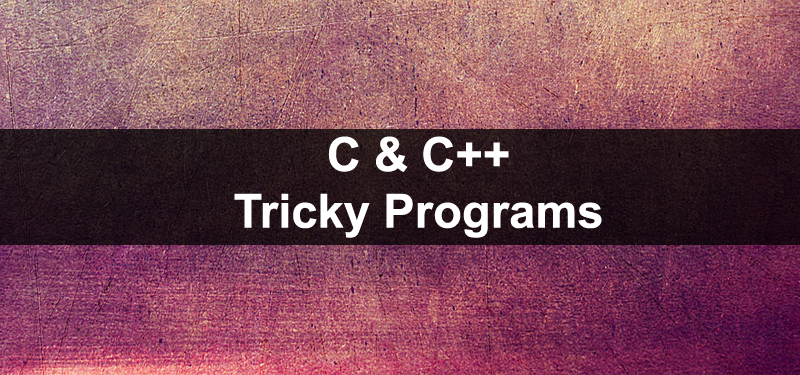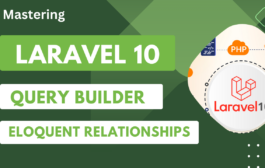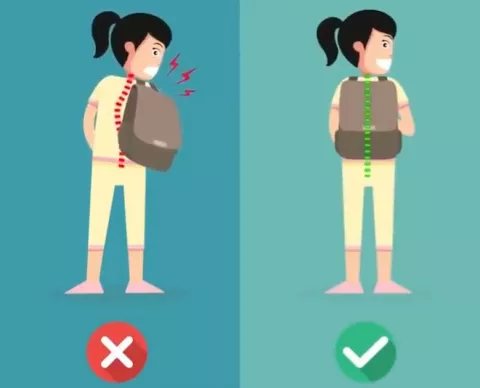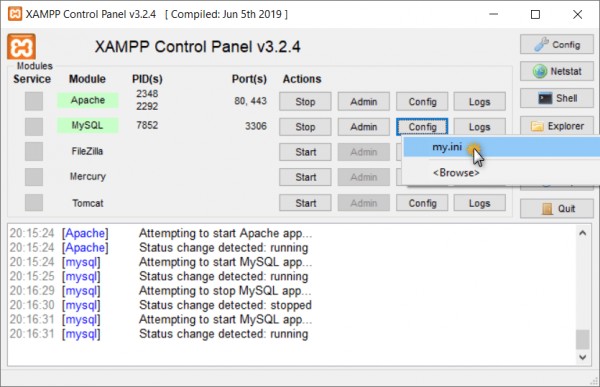There are various tricky programs in our day to day life. May be in technical interviews, coding tests, or in C/C++ classrooms.
Here are some of such programs:
1. Print text within double quotes (” “).
This may seem easy but beginners may get puzzled while printing text within double quotes.
// CPP program to print double quotes
#include<iostream>
int main()
{
std::cout << "\"geeksforgeeks\"";
return 0;
}
Output:
"geeksforgeeks"
2. To check if two numbers are equal without using arithmetic operators or comparison operators.
The simplest solution for this is using Bitwise XOR operator (^). We know that, for two equal numbers XOR operator returns 0. We will use this trick to solve this problem.
// C program to check if two numbers are equal
// without using arithmetic operators or
// comparison operators
#include<stdio.h>
int main()
{
int x = 10;
int y = 10;
if ( !(x ^ y) )
printf(" x is equal to y ");
else
printf(" x is not equal to y ");
return 0;
}
Output:
x is equal to y
3. Print all natural numbers upto N without using semi-colon. We use the idea of recursively calling main function.
// CPP program to print all natural numbers upto
// N without using semi-colon
#include<iostream>
using namespace std;
int N = 10;
int main()
{
static int x = 1;
if (cout << x << " " && x++ < N && main())
{ }
return 0;
}
Output:
1 2 3 4 5 6 7 8 9 10
4. Program to find Maximum and minimum of two numbers without using any loop or condition.
The simplest trick is-
// CPP program to find maximum and minimum of
// two numbers without using loop and any
// condition.
#include<bits/stdc++.h>
int main ()
{
int a = 15, b = 20;
printf("max = %d\n", ((a + b) + abs(a - b)) / 2);
printf("min = %d", ((a + b) - abs(a - b)) / 2);
return 0;
}
Output:
max = 20 min = 15
5. Print the maximum value of an unsigned int using One’s Compliment (~) Operator in C.
Here is a trick to find maximum value of an unsigned int using one’s compliment operator:
// C program to print maximum value of
// unsigned int.
#include<stdio.h>
int main()
{
unsigned int max;
max = 0;
max = ~max;
printf("Max value : %u ", max);
return 0;
}
Output:
Max value : 4294967295
6. To find sum of two integers without using ‘+’ operator.
This is a very easy mathematics trick.
We know that a + b = – (-a-b). So this will work as a trick for us.
// CPP program to print sum of two integers
// withtout +
#include<iostream>
using namespace std;
int main()
{
int a = 5;
int b = 5;
int sum = -( -a-b );
cout << sum;
return 0;
}
Output:
10
7. Program to verifies the condition inside if block.
// CPP program to verifies the condition inside if block
// It just verifies the condition inside if block,
// i.e., cout << "geeks" which returns a non-zero value,
// !(non-zero value) is false, hence it executes else
// Hence technically it only executes else block
#include<iostream>
using namespace std;
int main()
{
if (!(cout << "hello"))
cout <<" hello";
else
cout << " world";
return 0;
}
Output:
hello world
8. Program to divide an integer by 4 without using ‘/’ operator.
One of the most efficient way to divide an integer by 4 is to use right shift operator (“>>”).
// CPP program to divide a number by 4
// without using '/'
#include<iostream>
using namespace std;
int main()
{
int n = 4;
n = n >> 2;
cout << n;
return 0;
}
Output:
1
9. Program to check endianness of the computer.
// C program to find if machine is little
// endian or big endian.
#include <stdio.h>
int main()
{
unsigned int n = 1;
char *c = (char*)&n;
if (*c)
printf("LITTLE ENDIAN");
else
printf("BIG ENDIAN");
return 0;
}
Output:
LITTLE ENDIAN
10. Write a c++ program to print fibonacci series without using recursion.
#include <iostream>
using namespace std;
int main() {
int n1=0,n2=1,n3,i,number;
cout<<"Enter the number of elements: ";
cin>>number;
cout<<n1<<" "<<n2<<" "; //printing 0 and 1
for(i=2;i<number;++i) //loop starts from 2 because 0 and 1 are already printed
{
n3=n1+n2;
cout<<n3<<" ";
n1=n2;
n2=n3;
}
return 0;
}
Output:
Enter the number of elements: 10 0 1 1 2 3 5 8 13 21 34






























